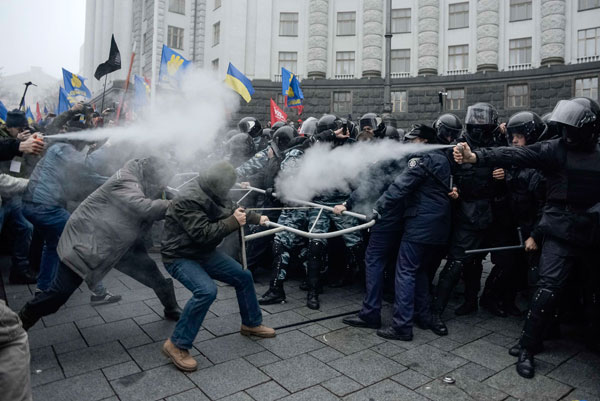The Lithuanian capital of Vilnius is hosting the European Union's third Eastern Partnership summit, which many expected to be a major EU triumph because of the scheduled signing of an Association Agreement with Ukraine. The Eastern Partnership project was initiated by Poland (later joined by Sweden), for the gradual economic and political integration of six former Soviet republics into the EU. Though Armenia, Azerbaijan, Belarus, Georgia and Moldova are also part of the Eastern Partnership, Ukraine is seen as the "prize catch" by the EU.

Protesters clash with riot police during a rally to support EU integration in central Kiev November 24, 2013. Tens of thousands of supporters of Ukraine's European integration flooded central Kiev to protest against the government's decision to drop plans to sign a landmark deal with the European Union in Vilnius on November 29 and to revive talks on ties with Russia. [Photo / Agencies]
If the EU could sign the Association Agreement, including ratification of free trade and visa liberalization deals, the Vilnius summit would become a milestone in the history of EU expansion, because despite not being equal to granting EU membership, the agreement is a key step toward integration into the EU.
But Ukraine has upset the EU's calculations by deferring the EU pact, ostensibly under Russia's pressure. And thousands of Ukrainians have taken to the streets demanding that their government go ahead with the past with EU.
Russia has voiced its opposition to the EU-Ukraine deal, with the Russian President Vladimir Putin saying that the proposed free trade deal between the EU and Ukraine would have been a "major threat" to the Russian economy. As a result, the Ukrainian government suspended talks on the political and free trade deals last week.
Politics has undergone a change in Ukraine over the last couple of years. The pro-Western foreign policy of former president Viktor Yushchenko has been replaced by what many consider a more balanced approach. After assuming office in 2011, Ukrainian President Viktor Yanukovych restored the balance between Russia and the West by eschewing Ukraine's NATO aspirations and extending the lease of Crimean facilities to Moscow's Black Sea Fleet.